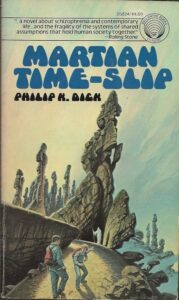Each month, we ask a member of faculty to tell us about one book that played an outsized role in making them who they are today. For our first Words to Live By of the 2024-25 academic year, we chat with Michael Bennett, Assistant Professor, Contemporary Studies and FYP, about the impact of one particular sci-fi novel and the deep questions the genre can pose for today’s world.
What book have you chosen?
 Martian Time-Slip by Philip K. Dick. A relatively minor work in his canon, written in the early sixties, it’s kind of about corrupt land speculation on Mars in the remote future of 1994—which doesn’t sound that interesting, except that foiling the plot of the would-be speculators involves time-travel and altered perceptions of reality.
Martian Time-Slip by Philip K. Dick. A relatively minor work in his canon, written in the early sixties, it’s kind of about corrupt land speculation on Mars in the remote future of 1994—which doesn’t sound that interesting, except that foiling the plot of the would-be speculators involves time-travel and altered perceptions of reality.
How and when did you come across this book?
In high school I loved to read sci-fi novels and would trawl used bookstores for old yellowing mass market paperbacks with beautiful but mysterious art on their covers. Naturally, people had recommended classics to me like Brave New World, I,Robot, and so on, but undifferentiated rummaging exposed me to all kinds of weird stuff.
What was it about the book that first stood out to you?
I didn’t love the book immediately, but there was something about the story that I always remembered. Two of the main characters are what you might call today “neurodivergent.” One of them, the handyman Jack Bohlen, is described as a recovering “schizophrenic,” and the other, Manfred, lives in a psychiatric clinic with non-speaking “autism.” These labels are not clearly distinguished in the novel (which is not really Dick’s fault: the psychologist who coined the two terms in the 1920s had called autism a “schizoid”—that is, schizophrenia-like—personality disorder), and it goes without saying that they don’t precisely correspond to the conditions for which psychologists use the same words today. But the most striking thing about the representation of mental illness or neurodiversity here is that it is connected to the experience of time. Basically, for Manfred, the world is accelerated to the point that it contains too much information to process. I once read that this was a theory about autism floating around in the 1950s and 60s, but Dick’s sci-fi conceit is that some of Manfred’s excess perceptual information is about what hasn’t happened yet. In other words, he can predict the future.
 How did this book shape you?
How did this book shape you?
I didn’t know it at the time, but the idea that people living with developmental disabilities or psychological differences have a kind of superpower is an old trope. It goes back at least to the Victorian doctor John Down (of Down’s Syndrome fame) who coined the term “idiot savant.” What I think is valuable about Dick’s version of this trope, and what stayed with me, was the connection between speed and information overload. If you go too fast, you miss too much, and it makes things a lot harder—or even impossible—to communicate clearly. Maybe this isn’t the right lesson to take from the novel, but it helped me see that speed was dangerous. Speed was the enemy. When I first watched one of my favourite films, the experimental documentary Koyaanisqatsi (dir. Godfrey Reggio, 1982), the sped-up timelapses of people, cars, lights, flowing around reminded me of Manfred in Martian Time-Slip. One of my favourite quotes from one of my favourite thinkers (Wittgenstein) is: “This is how philosophers should greet each other: ‘Take your time!’”
What do you think it is about this book that made such an impact?
More generally, an early exposure to Philip K. Dick showed me not only that science fiction can be a genre of ideas, asking deep questions and coming to interesting insights, but also that it can engage with the contemporary world in illuminating ways. This is what I think people mean when they characterize Dick himself (in the same way he characterized Manfred in his novel) as prophetic. Martian Time-Slip really lies in the sweet spot for me: written in the post-war period that I think is one of the most interesting and the subject of my research and at the intersection of philosophy, science, and technology, which is where I do most of my teaching. Unsurprisingly, I assign sci-fi stories in many of my classes at King’s—though I’ve actually never assigned anything by PKD.
Have you reread this book? Does it resonate differently today than it did on first reading?
As I said, I didn’t love the book when I first encountered it. It was too difficult for me probably. Dick was always a weird, slightly unpleasant writer—increasingly so, in my opinion, by his later works of the 1970s and 80s. It’s no surprise that he never broke into the mainstream of literary fiction like he wanted to. Returning to this novel as a more seasoned reader, I can see there’s lots in it that my perceptual experience in high school (again, like Manfred’s) simply couldn’t process and filtered out. In particular, there’s a whole colonial element and a critique of colonization in the book. Mars has indigenous inhabitants, they too have some altered time-perception, and they fight back against the speculators buying their land. Moreover, it is implied, they save Manfred from a lifetime of institutionalization. People love Frank Herbert’s Dune, which was written a few years later, despite its being saturated with more stale and pernicious colonial tropes. Martian Time-Slip covers similar thematic material in a better way.

